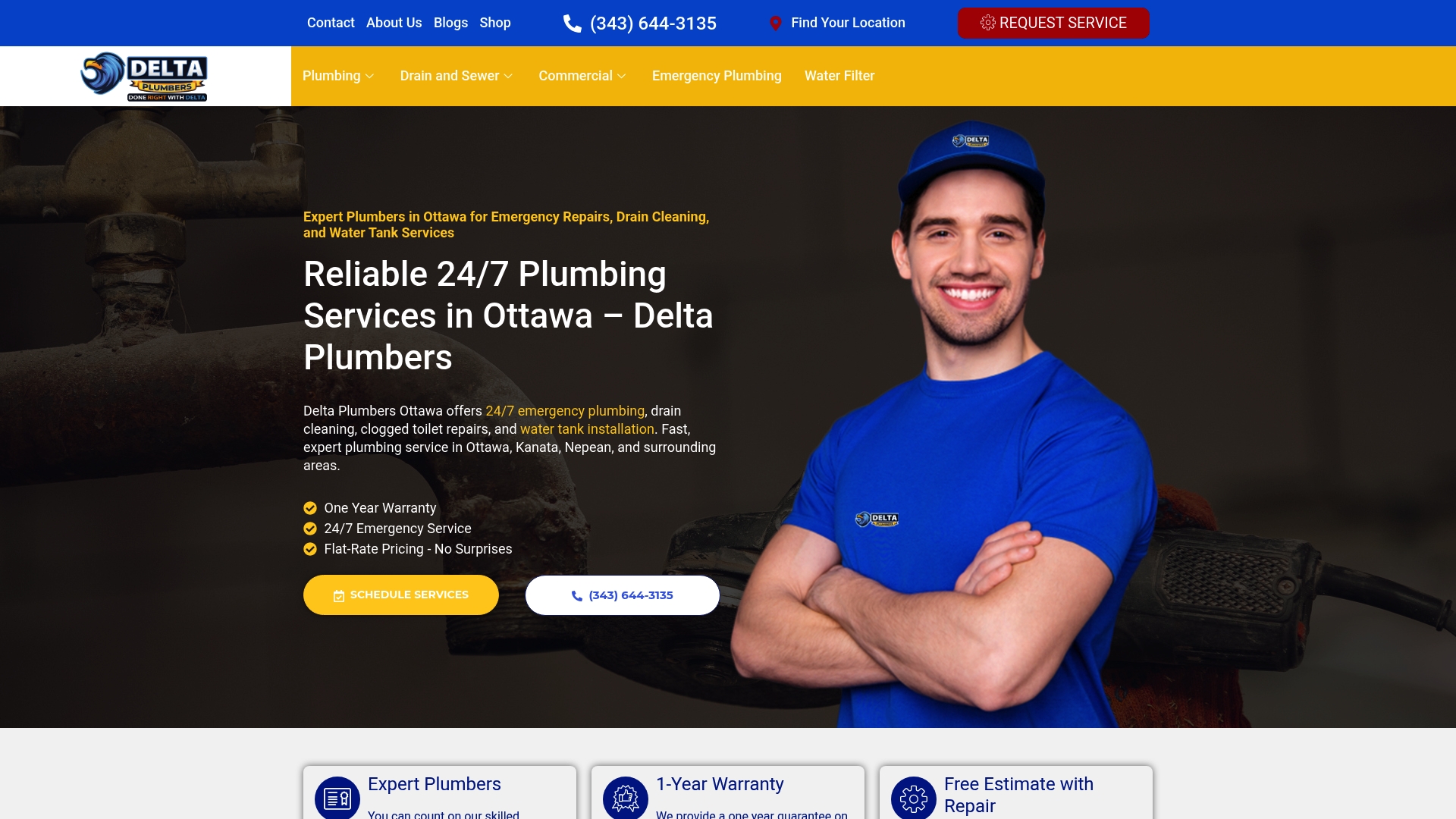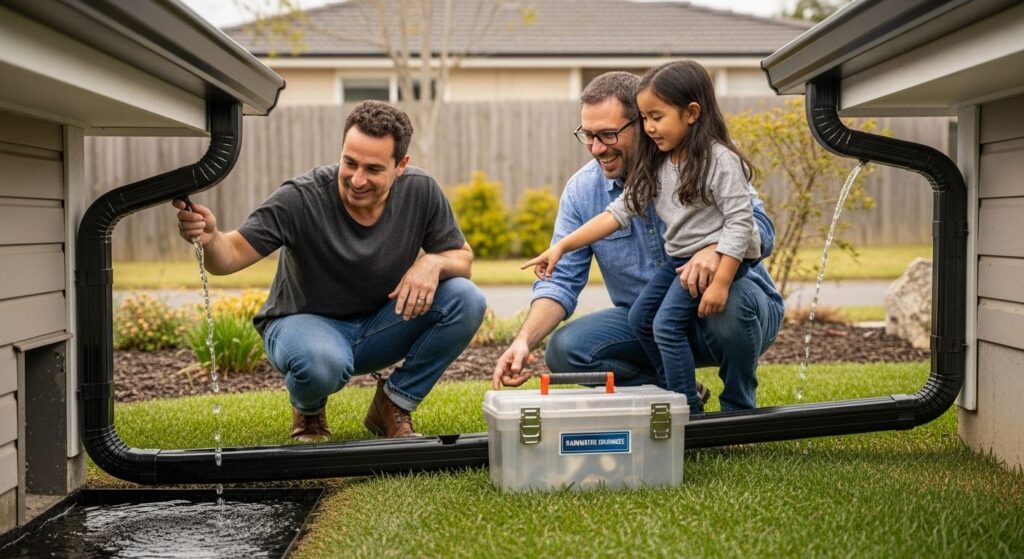Managing rainwater might sound simple at first and yet poor drainage is responsible for up to 90 percent of basement water problems in Canadian homes. Most people assume it just takes a few gutters to keep things dry. The truth is, smart rainwater drainage solutions go way beyond pipes and downspouts and can actually boost your property’s value while fighting environmental issues at the same time.
Table of Contents
- What Are Rainwater Drainage Solutions?
- Why Rainwater Drainage Matters For Property Management
- How Rainwater Drainage Systems Function
- Key Components Of Effective Rainwater Drainage Solutions
Quick Summary
| Takeaway | Explanation |
|---|---|
| Effective drainage prevents property damage | A well-designed system protects structures against water accumulation, avoiding costly repairs. |
| Rainwater management supports sustainability | Proper systems help conserve water and support environmental efforts while promoting responsible property management. |
| Key components include gutters and drains | Critical elements like gutters, downspouts, and French drains direct water safely away from structures. |
| Transform challenges into opportunities | Implementing effective drainage systems allows homeowners to enhance landscapes while safeguarding their investments. |
| Regular inspection ensures optimal performance | Understanding your drainage infrastructure through inspections can maintain system effectiveness and longevity. |
What Are Rainwater Drainage Solutions?
Rainwater drainage solutions are comprehensive systems designed to manage and redirect water runoff from residential and commercial properties, preventing potential water damage and supporting environmental sustainability. These solutions involve strategic approaches to collecting, channeling, and utilizing rainwater effectively.
Understanding Water Management Systems
Rainwater drainage solutions encompass various technologies and techniques engineered to control water flow during precipitation events. The primary goal is protecting buildings, landscapes, and infrastructure from water accumulation and potential structural damage. According to Environmental Protection Agency, effective drainage systems can significantly reduce erosion, prevent flooding, and mitigate water pollution risks.
Key components of comprehensive rainwater drainage solutions typically include:
- Gutters and Downspouts: Collecting roof runoff and directing water away from building foundations
- French Drains: Underground perforated pipes that redirect groundwater and surface runoff
- Swales and Bioretention Areas: Landscape features that naturally filter and absorb excess water
Environmental and Practical Benefits
Modern rainwater drainage solutions go beyond simple water redirection. They represent intelligent water management strategies that balance practical infrastructure needs with environmental conservation. Homeowners can transform drainage from a potential problem into an opportunity for water conservation, landscape preservation, and sustainable property management.
These systems not only protect property from water damage but also contribute to groundwater recharge, reduce municipal stormwater system strain, and can even support landscape irrigation through strategic water collection and redistribution techniques. Delta Plumbers Ottawa’s guide on water efficient plumbing offers additional insights into sustainable water management practices for homeowners.
Why Rainwater Drainage Matters for Property Management
Rainwater drainage is a critical aspect of property management that directly impacts structural integrity, financial investment, and long-term property sustainability. Ineffective water management can lead to significant structural damage, potentially costing homeowners thousands of dollars in repairs and compromising the overall value of their property.
Structural Protection and Risk Mitigation
Proper rainwater drainage systems are essential for protecting buildings against water-related deterioration. According to National Association of Home Builders, unmanaged water runoff can cause foundational issues, basement flooding, and progressive structural weakening. The potential risks include:
- Foundation Damage: Water pooling around building foundations can cause cracking, settlement, and long-term structural instability
- Landscape Erosion: Uncontrolled water flow can wash away soil, damage landscaping, and create uneven terrain
- Mold and Moisture Proliferation: Persistent moisture creates ideal conditions for mold growth and wood rot
Financial and Environmental Considerations
Beyond immediate structural concerns, effective rainwater drainage represents a strategic investment in property maintenance. Well-designed drainage solutions not only prevent costly water damage but also contribute to sustainable water management. Delta Plumbers Ottawa’s comprehensive drainage insights highlight how proactive water management can significantly reduce long-term maintenance expenses and environmental impact.
Smart drainage solutions enable property owners to transform potential water-related challenges into opportunities for landscape preservation, water conservation, and sustainable property management.
The following table compares key practical and environmental benefits of modern rainwater drainage solutions as discussed in the article.
| Benefit Type | Description | Example from Article |
|---|---|---|
| Structural | Protects foundations, prevents flood and erosion | Protects buildings from water-related deterioration |
| Financial | Reduces costly repairs and long-term maintenance expenses | Stops costly repairs and preserves property value |
| Environmental | Supports groundwater recharge, reduces stormwater system strain | Encourages landscape irrigation and water conservation |
| Sustainability | Promotes responsible water use and eco-friendly property management | Reduces environmental impact and fosters sustainability |
| By implementing comprehensive rainwater drainage strategies, homeowners protect their most significant financial asset while contributing to broader environmental conservation efforts. |
How Rainwater Drainage Systems Function
Rainwater drainage systems are sophisticated engineered networks designed to capture, redirect, and manage water runoff from residential and commercial properties. These intricate systems work through a series of interconnected components that efficiently collect, transport, and disperse water to prevent potential damage and support environmental sustainability.
Collection and Capture Mechanisms
The initial stage of rainwater drainage involves strategic water collection points that capture precipitation from various surfaces. According to Canada Mortgage and Housing Corporation, effective drainage systems typically incorporate multiple collection mechanisms:
- Roof Catchment Areas: Gutters and downspouts that collect water directly from roof surfaces
- Surface Drainage Channels: Sloped landscapes and constructed channels that guide water flow
- Permeable Surfaces: Specialized ground surfaces that allow water to infiltrate and be naturally absorbed
Water Redirection and Management Techniques
Once water is collected, drainage systems employ advanced techniques to safely redirect and manage water flow. These techniques prevent water accumulation near building foundations, mitigate erosion risks, and support sustainable water distribution. Critical components include underground pipe networks, French drains, and landscaped bioretention areas that naturally filter and redistribute water.
Delta Plumbers Ottawa’s drain inspection services can help homeowners understand the intricate details of their existing drainage infrastructure, ensuring optimal system performance. By combining gravity-driven flow principles with engineered design, these systems transform potential water management challenges into efficient, environmentally responsible solutions that protect property and support natural water cycles.
Key Components of Effective Rainwater Drainage Solutions
Effective rainwater drainage solutions require a sophisticated integration of structural, technological, and environmental components that work together to manage water flow efficiently. These systems are engineered to protect properties from water-related damage while supporting sustainable water management practices.
Below is a table summarising the main components of effective rainwater drainage solutions and their core functions for homeowners.
| Component | Function | Benefit |
|---|---|---|
| Gutters and Downspouts | Collect roof runoff and direct water away from foundations | Prevents basement flooding and erosion |
| French Drains | Underground pipes redirect surface and groundwater | Reduces risk of foundation instability |
| Swales and Bioretention Areas | Naturally filter and absorb excess water in landscapes | Supports groundwater recharge, reduces runoff |
| Grading and Slope Design | Shapes landscape to guide water flow naturally | Minimises water pooling near structures |
| Underground Drainage Pipes | Transport water from collection points to dispersal areas | Protects property and manages high volumes |
| Permeable Surfaces | Allow water infiltration and absorption | Reduces strain on municipal systems |
Structural Elements and Collection Infrastructure
The foundation of any robust rainwater drainage system lies in its structural components. According to Canadian Water Resources Association, successful drainage infrastructure depends on strategically designed elements that capture and redirect water
 :
:
- Gutters and Downspouts: Precision-engineered channels that collect roof runoff and direct water away from building foundations
- Grading and Slope Design: Carefully calculated landscape contours that naturally guide water flow
- Underground Drainage Pipes: Networked conduits that transport water from collection points to designated dispersal areas
Advanced Water Management Technologies
Modern rainwater drainage solutions incorporate sophisticated technologies that go beyond traditional water redirection. These advanced systems focus on water quality, conservation, and environmental integration. Techniques such as permeable pavements, bioswales, and rain gardens transform drainage from a simple utility function into a comprehensive water management strategy.
Delta Plumbers Ottawa’s water efficient plumbing guide provides additional insights into innovative water management techniques. By combining engineered infrastructure with natural water absorption principles, homeowners can create drainage solutions that protect their property while contributing to broader environmental sustainability goals.

Protect Your Home with Proven Rainwater Drainage Solutions
Worried about water pooling around your home, foundation cracks, or the risk of basement flooding during Ottawa’s unpredictable seasons? As highlighted in our article, properly designed rainwater drainage systems are not just a good idea—they are essential for safeguarding your home and preserving its value. Finding the right solution can be overwhelming, but you don’t have to face these challenges alone. For more tips and information, visit our Uncategorized Archives – Delta Plumbers | Ottawa category and tap into our expertise.

Act now to prevent costly damage and secure peace of mind. Let the experienced team at Delta Plumbers Ottawa assess your drainage needs, address your specific concerns, and deliver results that last. Reach out today for tailored advice and see how our custom solutions can help protect your property from water damage. Your home’s safety and value are too important to leave to chance.
Frequently Asked Questions
What are the main components of rainwater drainage solutions?
The primary components include gutters, downspouts, French drains, swales, and bioretention areas. These elements work together to collect, redirect, and manage rainwater runoff effectively.
How do rainwater drainage systems prevent structural damage?
Effective rainwater drainage systems redirect water away from building foundations, preventing pool formation which can lead to foundation cracking, settlement, and moisture-related issues like mold growth.
What are the environmental benefits of using rainwater drainage solutions?
These systems contribute to groundwater recharge, reduce municipal stormwater system strain, and promote landscape irrigation, fostering a more sustainable and eco-friendly property management approach.
How can homeowners maintain their rainwater drainage systems?
Regular inspection and maintenance are crucial. Homeowners should clean gutters, check downspouts for blockages, and ensure that French drains and bioretention areas are functioning properly to prevent water accumulation and erosion.









